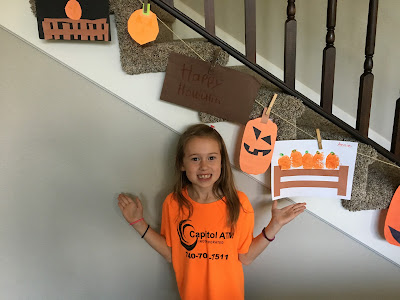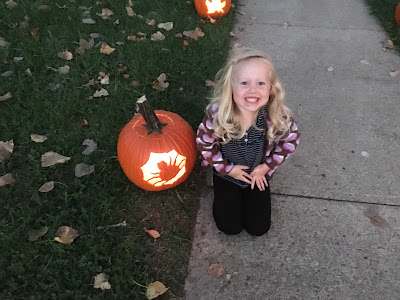Our seasoned professor was insightful and I honestly did walk away from that class in 2008 with a new appreciation for classical music and art. It was also in that class that I was first confronted with a completely unrelated idea: the ethics of celebrating Halloween. Our teacher offhandedly mentioned to all of us, as the holiday approached, that his family did not celebrate it and that we may want to become more informed on the subject ourselves.
My interest was piqued. I read different histories of the holiday. Just like Christmas, I saw that Halloween has pagan roots, starting as a commemoration of the turning seasons, later adapted to serve Christian views, influencing its name (though that aspect appears to have had much less staying power). Check out this video for a brief synopsis. For these beginning communities, the ensuing colder, shorter days brought with them a very personal upsurge in hardship and death. As a way to cope with these difficult realities, people turned to stories and rituals (as humankind has always done) in hopes to cope with, ward off, or in some way manage the tolls taken by their unfeeling natural surroundings. Stories are powerfully meaningful and grounding, which is probably why our Savior told so many of them, and probably why the very spreading of the His gospel has largely been through the stories found in Scripture.
Over time, trending stories and rituals emerged into the popular Halloween traditions we see today. Intermixed with those fairly simple roots are some truly demonic convictions and practices that are demeaning, deceiving, and destructive. After all, Christians everywhere believe that in connecting with the "spiritual world," we find strength and power and intercession in our darkest days--but that spiritual connection is through Christ alone--"I am the door: by me if any man enter in, he shall be saved, and shall go in and out, and find pasture" (John 10:9). Misled "spiritual" connection, supplication, or fascination is powerfully dark and damaging.
But looking back on my own memories--years of inventing costumes, front porch jack-o-lanterns, school festivals, swapping candy and learning by experience about managing my intake--all these were sugared memories with friends, siblings, neighbors, and strangers. There was certainly no demonic intention for us then, nor is there now.
I love this quote by Dave Ramsey: “Money is not good or evil. It has no morals or intentions on its own. Money reflects the character of the user.” In my experience, that is true of many inanimate objects or ideas. Technology, clothing, and many pastimes and traditions reflect the character of the user. They carry no intrinsic wrongness or rightness of their own. Simply because a symbol has been used for something against my values in the past, does not mean I cannot rewrite the meaning of that symbol in my life and home. That is precisely what disciples do with many symbols of Christmas, giving inspiring Christian stories and meaning to something that, at one time (and in other homes today), "means" something entirely different.
Some Halloween traditions are definitely wrong to us, but our Halloween traditions play a role in our family that we both enjoy and value. As devout disciples of our Lord Jesus Christ, we do not align ourselves with anything that devalues what He embodies. Our family is guided by that principle. Devilish synergy, senseless fear, and crude dress and behavior are not any part of our lives--as amusement or otherwise! However, what others choose to do with their celebration does not tarnish our own expression of it.
A fresh squash from our garden makes a lovely canvas for artistic expression, and lighted candles add a solemn element of wonder and joy.
Our imaginations relish the opportunity to get decked out as our favorite heroes, animals, or invented characters--for kids and grown-ups! We see the joy of fantasy as a truly godly gift to awaken our minds to greater vision and creativity, and that quality is wildly alive in our family's Halloween celebrations.
...which may end up being quite scary!
It strikes me as pertinent that we instigate "scaring" games with our children even when they are babies: playing peek-a-boo, tossing and catching them in the air, or chasing and capturing toddlers in tickle attacks. We take it to the next level when we playfully tell our children, "Brush your teeth or the tickle monster will get you!" The idea that a looming threat is there, while required activities can keep it at bay, is an adventure few children turn down. Why? Because playing the combatant gives us courage to believe we can engage in the battles of real life. We parents play these games gently, never pushing our children to tears, yet always relishing the thrill of inventing new surprises--and challenges!--for them.
We believe this play is vital to our little ones. It teaches them to face fears while strapped into the parachute of their parents' presence, always returning safely to strong, knowing arms. Aligned with our ethics, Halloween is one way to experience another level of that game. We can see scary things, things we don't understand, things that turn out to be not what they seem, and we can overcome them. We can stand brave and strong. We can debunk myths. Of course, every adult and child will have different levels of tolerance and interest in this aspect, which should be respected, just as every family will find their own answers to the questions of this holiday.
As far as our family is concerned, there is a magical purpose in celebrating Halloween: in renaming what may be twisted by evil into something of light, hope, and joy for ourselves and those around us.
















.jpg)
No comments:
Post a Comment